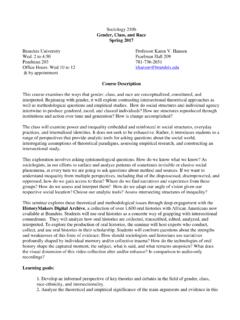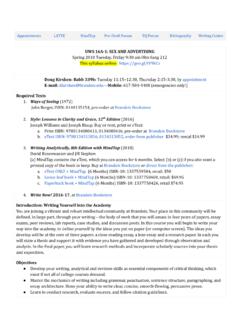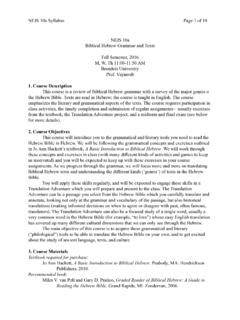Transcription of THE NEW EUROPE EUROPEAN ECONOMIC AND POLITICAL …
1 POLITICAL Science 153A Fall 2014 Professor Lucy Goodhart Room: TBA Office: Golding 87-23 (Basement) Tues/Fri: 12:30 1:50 Email: Office Hours: Tuesday 2:15 4:00 pm THE NEW EUROPE : EUROPEAN ECONOMIC AND POLITICAL INTEGRATION Introduction This course is designed to fulfil a number of separate goals. The first is to give you an understanding of what the new, unfolding, international phenomenon that we call the EUROPEAN Union actually is. Thus Sections II and III cover where the EU came from, as a set of negotiated treaties, and how it decides on joint EUROPEAN policies.
2 This part of the course is designed for those who have an interest in EUROPEAN politics and may have been to EUROPE lately. The EU is, however, of interest to students of politics in general not just because of what it does but because of what it signifies as a departure from the conventional wisdom of international politics. The EU is a fascinating anomaly to our assumption of national self-determination. Instead of seeking more powers, the member nations of the EU have voluntarily agreed to pool their sovereignty and engage in much closer POLITICAL and ECONOMIC integration. The important question is why.
3 This question is fully engaged in Section IV, which looks in more detail at what EUROPE actually does and whether the EU is becoming a functioning, federal state. This part of the course should appeal to students with an interest in international relations and to those whose knowledge of American POLITICAL history allows them to appreciate the parallels with the EUROPEAN case. In deciding core matters jointly, however, the EU may be achieving goals that are dear to its leaders, but may also be moving further from direct, democratic control by its citizens. In the very first, substantive session of the course, we examine the current crisis in EUROPEAN legitimacy.
4 Later, in Section V, we take on the key normative questions that occupy the citizens of EUROPE and its philosophers. Does the EU have what it takes to be a democracy? If not, how can it come closer to that goal and what do the most recent EUROPEAN Parliament elections mean for what citizens think of the EU? This part of the course is particularly for students who have an appetite for POLITICAL philosophy and who want to think about what we need for democracy to work. Pre-requisites While the course has no formal requirements, it is strongly recommended that you take it following an introductory course in POLITICAL science (or one of its subfields) and/or in international and global studies.
5 You may also consider yourself to have satisfied the pre-requisites if you have lived or studied in EUROPE in the last few years. 2 Requirements Specific readings will be assigned for each class and are indicated on the week-by-week outline that follows. You are expected to come to class having read the assigned material. The course will assume background knowledge of at least some of the 28 member states of the EUROPE Union as well as the EU institutions. In order to develop this knowledge, participants will be assigned guided research that will require you to prepare two three-page information summaries.
6 You will have a choice of writing on two of the three following topics: one of the EU s member states, one of its institutions or one of its policy areas. The timing of these assignments is indicated on the week-by-week outline. In addition to the information summaries, there will be a (short) in-class midterm, and a longer research paper along with two, short, in-class quizzes. The anticipated length of the paper is 10-15 pages. No makeup exam or quiz will be offered during the semester unless a student is forced to miss scheduled midterms due to documented serious illness or bereavement. The final grade will be calculated as follows: Two three-page information summaries: 15 percent each Research Paper: 25 percent Mid-term: 25 percent Quizzes: 5 percent each Participation 10 percent Grading: The letter grade will be based on a numeric scale in which an A (of whatever level) corresponds to a score of 90 or above, a B grade corresponds to a score of 80-89 and so on.
7 Please note that I will not give any extra-credit assignments. Grades will be computed entirely from the scores obtained on the assignments above. Attendance at classes is strongly encouraged and will be a factor in determining your participation grade. If you know that you cannot attend class on a given day, for a specific reason, please email me in advance to communicate this. Excused Absence Policy: If there is an emergency, a loss in your family, or if you experience health problems, you will need to communicate with an adviser at Academic Services, who can send your professors an email explaining the circumstances.
8 You will be then excused from attendance and assignments during the emergency. This is a standard university procedure for your convenience. Don't hesitate to get in touch with Academic Services. They can be very helpful. Reading Materials The main texts below are available at the Brandeis University bookstore and are also on reserve in the library : Simon Hix and Bjorn Hoyland, The POLITICAL System of the EUROPEAN Union, Third Edition, Basingstoke, Palgrave MacMillan, 2011. Desmond Dinan, Ever Closer Union: An Introduction to EUROPEAN Integration, Fourth Edition, Boulder, CO: Lynne Rienner, 2010. 3 Background Materials: To keep abreast of emerging controversies, students are encouraged to follow current events.
9 The best resources for this are The Financial Times ( ) and The Economist ( ). The EU also has a strong web presence with a plentiful supply of information and discussions. Some key websites are: EUROPEAN Commission s Europa Portal EUROPEAN Parliament Delegation of the EU Commission to the USA - EUROPEAN Central Bank Eurobarometer and other public opinion surveys -- Center for EUROPEAN Reform Last, but not least, you should be aware of data sets on comparative POLITICAL institutions, as a source of information on individual, EUROPEAN countries. These include, but are not limited to: Database of POLITICAL Institutions: ,,contentMDK:20649465~pagePK:64214825~pi PK:64214943~theSitePK:469382, Democratic Electoral Systems around the World: ~mrg217 CIA World Factbook: Economist Intelligence Unit Country Reports (available online at the library website): Freedom House Freedom in the World: #.
10 U71nVPldXMU I. INTRODUCTION Week One: September 2nd: The Idea of EUROPE Required: The United State of EUROPE , T. R. Reid, Penguin, 2004, 1-62. EU institutions explained by their presidents: Who s in the EU? Rowan Atkinson sings the EU anthem: September 5th: Is there a Crisis in EUROPEAN Legitimacy? Required: EUROPEAN Parliament Election Results: Economist Magazine: An Ever Deeper Democratic Deficit. Brookings Briefing: What do the EU Election Results Mean? : Week Two: September 9th: Special Event Lorenzo bini Smaghi talks at the Rosenberg Outlook Event on EUROPEAN crisis, austerity and the impact on democracy II.













